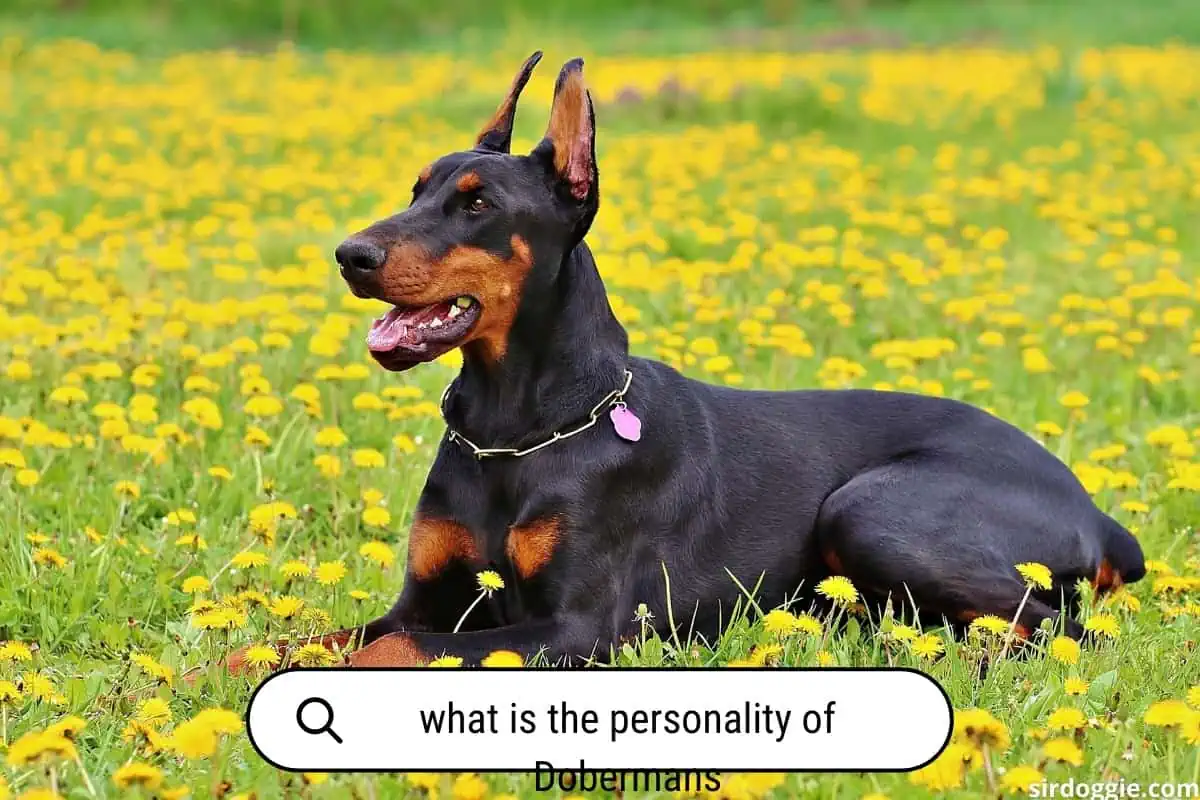What Is the Personality of Dobermans? (13 Traits)
Doberman Pinschers are known for their sleek, powerful appearance and their reputation as a formidable guard dog. But beyond their physical attributes, Dobermans are also known for their distinct personality traits.
Understanding the personality of a Doberman is important for anyone considering adding one to their family, as well as for current Doberman owners looking to better understand their furry companion.
One of the most notable personality traits of a Doberman is their loyalty. Dobermans are fiercely devoted to their families and will go to great lengths to protect them.

This loyalty also makes them highly trainable, as they are eager to please their owners. However, their protective nature can sometimes lead to aggression towards strangers or other animals, making early socialization and training crucial for a well-behaved Doberman.
Despite their reputation as a guard dog, Dobermans are also known for their affectionate and playful nature with their families. They crave attention and love to be included in family activities. However, their high energy levels mean they require plenty of exercise and mental stimulation. Without proper exercise and attention, Dobermans can become irritable or even destructive.
13 Distinctive Doberman Personality Traits
- Loyal: Dobermans are known for their unwavering loyalty to their families, standing by their side through thick and thin.
- Intelligent: Their high intelligence makes them quick learners and adept problem-solvers, always eager to please their owners.
- Alert: Dobermans are natural watchdogs, always on high alert to protect their home and loved ones from potential threats.
- Energetic: Bursting with energy, these dogs love staying active through exercise, play, and mental stimulation.
- Confident: Dobermans exude confidence, striding proudly with their heads held high and shoulders squared.
- Fearless: Their fearlessness in the face of danger makes them exceptional protectors and fearless companions.
- Affectionate: Don’t be fooled by their tough exterior; Dobermans are known to be gentle and loving with their families, enjoying cuddles and attention.
- Determined: When given a task, Dobermans display unwavering determination, working tirelessly to achieve their goal.
- Adaptable: Dobermans are highly adaptable, adjusting to new environments and situations with ease.
- Trainable: Their intelligence and eagerness to please make them highly trainable, excelling in various dog sports and disciplines.
- Playful: With a playful and spirited nature, Dobermans enjoy engaging in games and activities that challenge their minds and bodies.
- Social: Dobermans are social creatures, thriving in the company of their human companions and forming strong bonds with family members.
- Sensitive: These dogs are surprisingly sensitive, attuned to their owners’ emotions and eager to provide comfort and support when needed.
These 13 distinctive traits showcase the unique and captivating personality of Dobermans, making them exceptional companions and guardians.
Socialization and Training
Early Socialization
Dobermans are social dogs that require early socialization to build good behaviors and habits. Early socialization should begin in puppyhood and continue throughout their lives. Socialization involves exposing your dog to different people, animals, and environments. This helps your dog learn how to behave appropriately in different situations and reduces the risk of fear or aggression towards unfamiliar people or animals.

It is important to introduce your Doberman to a variety of people, including men, women, children, and people of different races and ages. You should also expose your dog to different environments, such as parks, beaches, and busy streets.
Obedience Training
Obedience training is essential for Dobermans. These dogs are intelligent and eager to please, but they can be stubborn and independent. Obedience training helps establish you as the pack leader and teaches your dog basic commands, such as sit, stay, come, and heel.
It is recommended to enroll your Doberman in a puppy training class, which can help socialize your dog and teach basic obedience commands. As your dog grows older, you can enroll them in advanced obedience classes to continue their training.
Exercise and Stimulation

Dobermans are high-energy dogs that require daily exercise and mental stimulation. Without proper exercise and stimulation, they can become bored and destructive.
It is recommended to provide your Doberman with daily exercise, such as a long walk or run, and playtime in a fenced-in yard. Mental stimulation can be provided through interactive toys, such as puzzle feeders or treat-dispensing toys.
Training your Doberman in a specific activity, such as obedience, agility, or tracking, can also provide mental stimulation and help build a strong bond between you and your dog.
| Task | Frequency |
|---|---|
| Introduce Doberman to different people and animals | Daily |
| Expose Doberman to different environments | Weekly |
| Enroll Doberman in puppy training class | Once |
| Provide daily exercise and playtime | Daily |
| Provide mental stimulation through interactive toys | Daily |
| Consider training Doberman in a specific activity | As desired |
Common Misconceptions
Aggressiveness
One of the most common misconceptions about Dobermans is that they are aggressive and dangerous dogs. While Dobermans are protective of their owners, they are not naturally aggressive. In fact, they are known for being loyal and affectionate companions. However, like any other breed, Dobermans can become aggressive if they are not properly trained and socialized.
If a Doberman is raised in a loving and nurturing environment and given the proper training and socialization, they can be wonderful family pets. It is important to note that aggression in dogs is often a result of poor training and handling by their owners, not an inherent trait of the breed.

Unpredictability
Another misconception about Dobermans is that they are unpredictable. This is simply not true. Dobermans are highly intelligent and trainable dogs, and they thrive on routine and consistency. They are also very sensitive to their owner’s emotions and can quickly pick up on any changes in their environment.
While it is true that Dobermans can be protective of their owners, they are not unpredictable or uncontrollable. With proper training and socialization, Dobermans can be well-behaved and obedient pets.
Inability to Coexist with Other Pets
Many people believe that Dobermans cannot coexist with other pets, such as cats or small dogs. While it is true that Dobermans have a high prey drive, they can be trained to coexist peacefully with other pets in the household.
Early socialization is key when it comes to introducing a Doberman to other pets. It is important to supervise all interactions between pets and to provide positive reinforcement when they behave well around each other. With patience and consistency, Dobermans can learn to coexist peacefully with other pets in the household.
History of Doberman Personality
Doberman Pinschers were originally bred by Karl Friedrich Louis Dobermann in Germany during the late 19th century. Dobermann was a tax collector who wanted a dog that could accompany him on his rounds and provide protection. He bred several different dog breeds, including the Rottweiler, German Pinscher, and Black and Tan Terrier, to create the Doberman Pinscher.

The Doberman Pinscher was originally bred to be a guard dog, and this has influenced their personality over time. Dobermans are known for their loyalty and protective nature towards their owners. They are also intelligent and highly trainable, which has made them popular as police and military dogs.
Over time, the personality of the Doberman Pinscher has evolved. Today, Dobermans are known for being energetic, affectionate, and playful dogs. They enjoy being with their owners and are fiercely loyal to them. They are also highly intelligent and require regular exercise and mental stimulation to remain happy and healthy.
While Dobermans have a reputation for being aggressive, this is not necessarily true. Like all dogs, a Doberman’s personality is shaped by their environment and training. With proper socialization and training, Dobermans can be friendly and well-behaved pets.
In summary, the Doberman Pinscher’s personality has been shaped by their history as a guard dog. Today, they are known for being loyal, affectionate, and intelligent pets. With proper training and socialization, they can make excellent companions for those who are willing to provide them with the care and attention they need.
Conclusion
Doberman Pinschers are a unique breed of dog with a distinctive personality. They are known for their loyalty, intelligence, and energy. With proper training and socialization, they can be excellent family pets and companions.
While they are often stereotyped as aggressive or dangerous, this is not necessarily true. Like any breed, Dobermans can be aggressive if not properly trained or socialized, but with the right care, they are generally friendly and affectionate.
Dobermans are also known for their protective nature. They are fiercely loyal to their owners and will do whatever it takes to protect them. This can make them excellent watchdogs and guard dogs, but it also means they require a lot of attention and training to ensure they do not become overly protective or aggressive.
Overall, Doberman Pinschers are a wonderful breed of dog for the right owner. They require a lot of attention, training, and socialization, but with the right care, they can be loyal, loving, and protective companions for many years to come.

Family Dog Expert Author
Hi there! I’m Stuart, a devoted dog lover and family dog expert with over a decade of experience working with our furry companions. My passion for dogs drives me to share my knowledge and expertise, helping families build strong, loving bonds with their four-legged friends. When I’m not writing for SirDoggie, you’ll find me hiking, playing with my beautiful dog, or studying music.